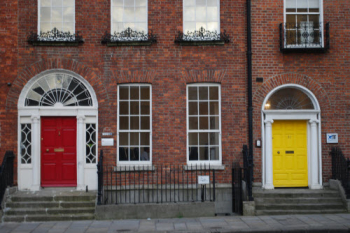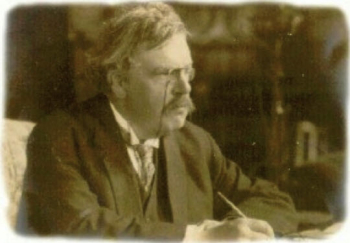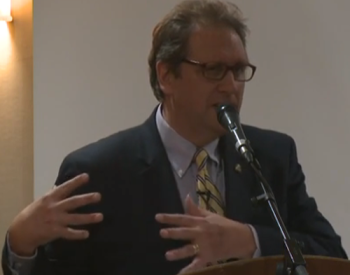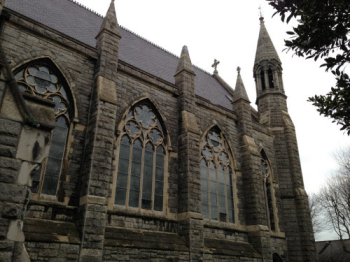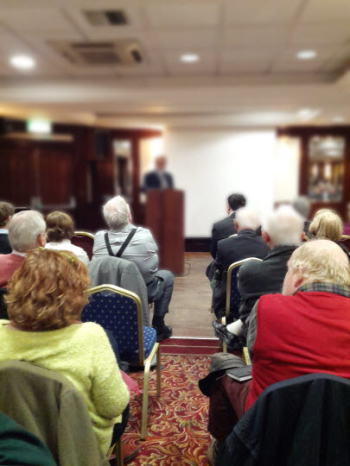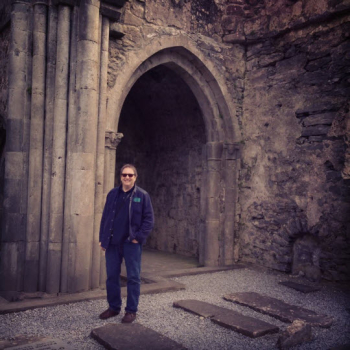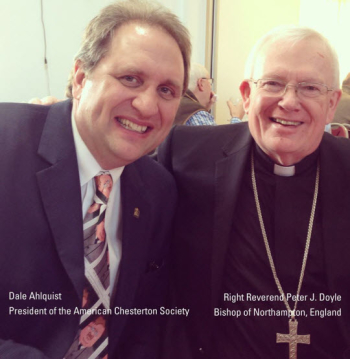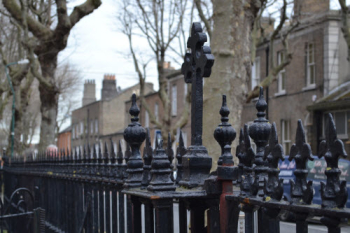Lenten Campaign 2025
This content is free of charge, as are all our articles.
Support us with a donation that is tax-deductible and enable us to continue to reach millions of readers.
“Most Irish consider G.K. Chesterton to be an Irishman and George Bernard Shaw to be an Englishman.”
Dale Ahlquist, the intrepid head of the American Chesterton Society, visited Dublin to talk with the Chestertonians there about their favorite author. Here, Dale tells Regina Magazine’s Tamara Isabell about his trip, the Irish, and Chesterton.
So, what brought you to Ireland? Is there much interest in Chesterton there?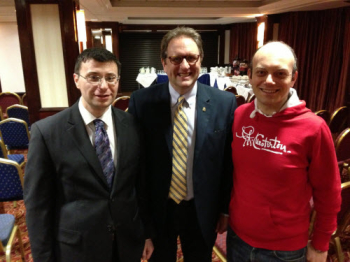
"The G.K. Chesterton Society of Ireland invited me. I gave talks in both Dublin and Limerick, but I did more listening than speaking. "
Thanks to your work, GK is becoming better known in Catholic circles, but he still is overlooked in our schools. Is it the same in Ireland? Do they study his works there?
During Chesterton’s lifetime, every school child would have been familiar with his poems, such as The Battle of Lepanto and The White Horse, as well as his essays. University students would have read his philosophical works (Orthodoxy), his social commentary (What’s Wrong with the World), and his novels (The Man Who Was Thursday). But after his death, the reading of Chesterton faded slowly from the classroom.
The resurgence of interest in his writings has come mostly from outside academia. At the university level, students now are discovering Chesterton by themselves. Today, we are seeing graduate students doing their master’s or doctoral theses on Chesterton. The problem for most of them is finding professors who know anything about Chesterton.
I had tea with the former chancellor of Trinity College in Dublin, one of the greatest universities in the world. He knew Chesterton’s works, but admitted that Chesterton is not taught at Trinity.
DUBLIN DOORWAYS NEAR TRINITY COLLEGE: "Today, we are seeing graduate students doing their master’s or doctoral theses on Chesterton. The problem for most of them is finding professors who know anything about Chesterton."
How did Chesterton feel about the Irish?
Chesterton was a great champion of the Irish, and they knew it and loved him for it. The Irish poet Maurice Leahy said that most Irish consider G.K. Chesterton to be an Irishman and George Bernard Shaw to be an Englishman.
Chesterton always argued for Irish home rule, and admired the Irish for their wit, resilience, and love for faith and family. The people of Ireland honored Chesterton by donating the church bell for the bell tower in Chesterton’s church in Beaconsfield, England, as a memorial to him.
"Chesterton always argued for Irish home rule, and admired the Irish for their wit, resilience, and love for faith and family."
How did his fellow Englishmen respond to his Irish sentiments?
I would say that most English intellectuals knew Chesterton was right, but they kept quiet about it. No one ever stepped forward to argue with him about his position on Ireland, as they would argue with him on economics or religion.
"Politicians, however, had to make an effort to studiously ignore Chesterton, who was their most faithful critic."
So many of GK’s writings have not only stood the test of time, but also have proven prophetic in many ways. Is this true of his writings about the Irish, as well?
Chesterton says that the Irish national spirit is always living because it is always dying. That sounds timely. And although it is not specifically a prophecy about the Irish, Chesterton was talking about Ireland when he said that every political question is ultimately a religious question.
"Although it is not specifically a prophecy about the Irish, Chesterton was talking about Ireland when he said that every political question is ultimately a religious question."
“The great Gaels of Ireland are the men that God made mad, For all their wars are merry, and all their songs are sad.” Would Chesterton say the same thing today?
In general yes, because Chesterton speaks in generalizations.
"There may be some sadness in their fighting these days and some shallow cackling in their contemporary music, but the Irish will not be satisfied with sad fighting and happy singing."
What is there of value to Americans today in GK’s “Irish Impressions”?
The three main themes apply to Americans today: the natural virtue of patriotism, the importance of the family as the basic unit of society, and the danger of irreligion that makes men passive.
Did you attend Mass while you were in Ireland? Your impressions?
"The churches that I visited in Ireland were ruins, destroyed by the English 500 years ago. In spite of their being piles of rock, they still are sacred places."
While most of our readers are familiar with Chesterton, some of them may not have read any of his works. Could you recommend a good starting point for someone new to Chesterton?
Well, I recommend that first timers start with the two introductory books that I wrote on Chesterton: The Apostle of Common Sense and Common Sense 101:Lessons from G.K. Chesterton.
"I design my books to open the gate to the world of Chesterton,such as his all-important Orthodoxy, a mixture of madness, fairy tales, suicide, and yacht and chariot rides."
And for our readers seeking some lesser-known gem to discover?
I recommend The Illustrated London News essays (which are part of the Collected Works published by Ignatius Press), and if you have access to a good library, the Daily News essays (published by Pickering and Chatto).
"And then there is Gilbert magazine, published by the American Chesterton Society, with quotes like this gem from 1930: “When people begin to ignore human dignity, it will not be long before they begin to ignore human rights.”’
I understand all Chesterton’s works will be more widely accessible soon?
Getting all Chesterton’s writing into an easily searchable, digital format is a project we have been working on for years. The first and biggest part of the project has been to collect all that he wrote: 100 books, 5,000 essays, hundreds of poems. In addition, we keep finding more, full of the Chesterton verbal fireworks and astonishing insight, like this gem: “The most important sort of knowledge is to know which things are worth knowing,” (from a 1932 article in Sign a Catholicmagazine).
We’ve made a lot of progress on this gigantic project. We’re hoping to work with a university to host a website to make this incomparable tool available.
And might we be calling him “Saint Chesterton” anytime soon?
Chesterton’s Cause has not been opened officially. The investigator is Canon John Udris, the spiritual director at St. Mary’s Seminary in Oscott, England. He will be speaking at our Chesterton Conference this summer at St. Mary’s on the Lake, Mundelein, Illinois, just north of Chicago. We hope that the result of Fr. Udris’ investigation will lead to Chesterton’s being declared a Servant of God.
"In the meantime, we have prayer cards. Ask for his intercession."
This article is published by permission of Regina magazine. All other rights strictly reserved.
